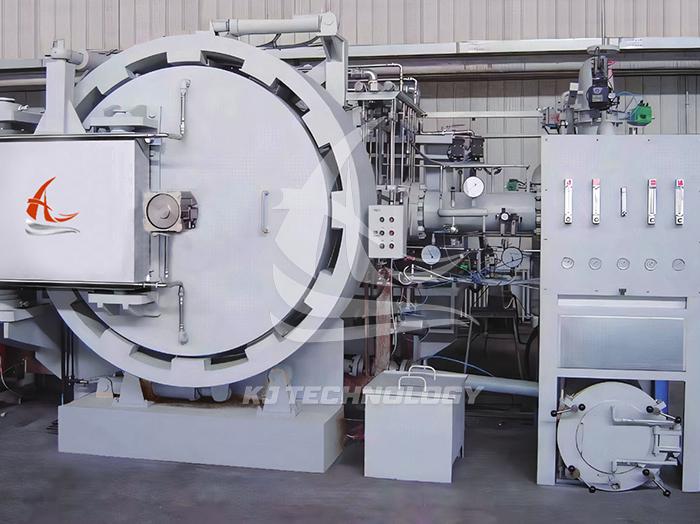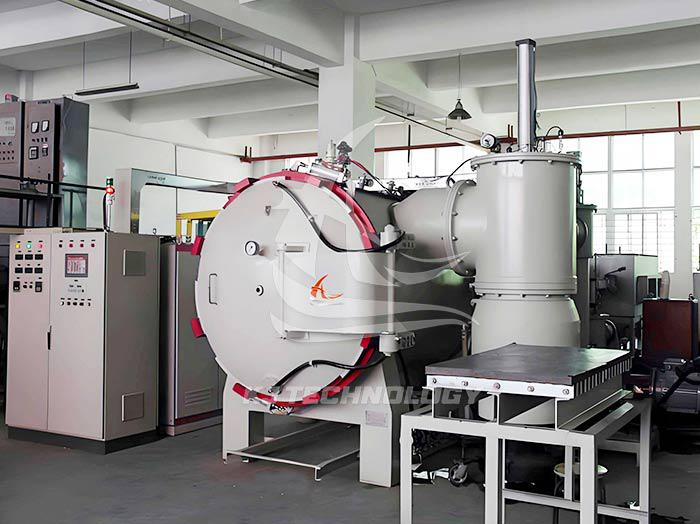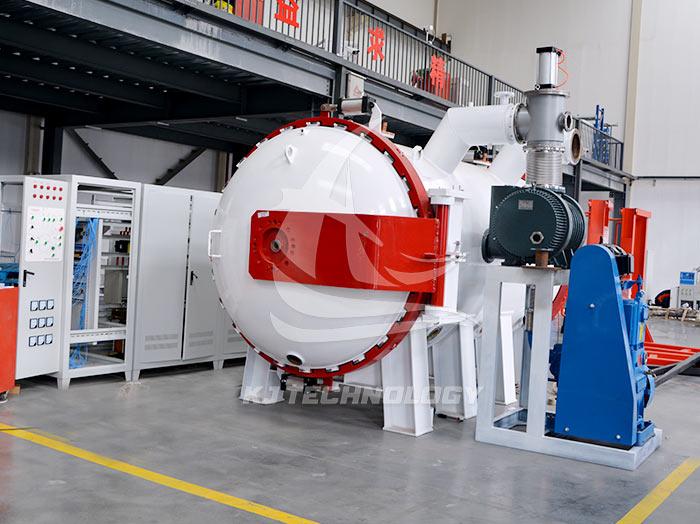What are the application scenarios for customized heat treatment vacuum furnaces?
 06-16-2025 Author: KJ technology
06-16-2025 Author: KJ technology
Customized heat treatment vacuum furnaces are widely used in various industrial fields due to their unique vacuum environment and precise temperature control capabilities. The following are typical application scenarios and specific explanations:
Aerospace field:
Heat treatment of engine components: Key components such as aircraft engine turbine blades and combustion chambers need to work in high temperature and high pressure environments. Customized heat treatment vacuum furnaces can achieve high-temperature vacuum quenching and aging treatment, improving the high-temperature strength, creep resistance, and fatigue life of materials. For example, nickel based high-temperature alloy blades can eliminate processing stress and optimize grain structure through vacuum heat treatment.
Titanium alloy component processing: Titanium alloy is widely used in aircraft structural components due to its low density and high strength. A vacuum furnace can prevent titanium alloys from reacting with oxygen and nitrogen at high temperatures, and improve their plasticity and toughness through vacuum annealing and solution treatment, ensuring the reliability of the components.
Automotive manufacturing field:
Heat treatment of mold steel: Automotive molds need to have high hardness, wear resistance, and fatigue resistance. Customized vacuum furnaces can perform vacuum quenching and tempering treatment on H13, S136 and other mold steels, achieving a mold hardness of HRC50-60 while reducing the risk of deformation and cracking.
High performance gear machining: Automotive transmission gears need to withstand high torque and friction. The vacuum furnace forms a high hardness carbide layer on the surface of gears through processes such as vacuum carburizing and carbonitriding, improving wear resistance and fatigue life while maintaining core toughness.
In the field of electronics and semiconductors:
Semiconductor material sintering: Ceramic substrates, packaging shells, etc. need to be sintered under high temperature and vacuum to avoid impurity contamination. Customized vacuum furnaces can achieve ultra-high temperature sintering above 1600 ℃, ensuring the density and electrical properties of materials.
Metalization and brazing: The metallization layer and brazed joint of electronic components need to be formed in an oxygen free environment. The vacuum furnace achieves high reliability connection by precisely controlling temperature and atmosphere, avoiding poor contact caused by oxidation.
Tools and Mold Industry:
High speed steel tool processing: High speed steel tools such as drill bits and milling cutters need to be vacuum quenched to obtain high hardness and red hardness. Customized vacuum furnaces can control quenching temperature and cooling rate, achieving tool hardness of HRC62-65 and extending service life.
Hard alloy forming: Hard alloy cutting tools and molds need to be sintered and formed under high temperature and vacuum. A vacuum furnace can prevent the oxidation of tungsten carbide and other powders during the sintering process, ensuring the hardness and wear resistance of the material.
In the field of new energy and new materials:
Lithium battery material processing: Positive electrode materials (such as LiCoO ₂) need to be calcined under high temperature and vacuum to remove impurities and optimize crystal structure. Customized vacuum furnaces can achieve precise temperature control and atmosphere regulation, improving the energy density and cycle life of batteries.
Post processing of 3D printed metal parts: Metal parts such as titanium alloys and stainless steel that are 3D printed need to undergo vacuum heat treatment to eliminate internal stress and improve mechanical properties. A vacuum furnace can prevent printed parts from oxidizing at high temperatures, ensuring dimensional accuracy and surface quality.
Medical device field:
Stainless steel instrument processing: Surgical knives, orthopedic implants, etc. need to have high corrosion resistance and biocompatibility. Vacuum furnaces eliminate processing stress, optimize grain structure, and enhance the reliability and safety of instruments through vacuum annealing and solution treatment.
Titanium alloy implant processing: Titanium alloy artificial joints and dental implants need to undergo heat treatment in a vacuum environment to avoid surface oxidation and impurity contamination. Customized vacuum furnaces can ensure the mechanical properties and biocompatibility of implants.
Research and University Laboratory:
New material research and development: Research institutions need to test the performance of new materials under extreme conditions. Customized vacuum furnaces can provide environments such as high temperature, high pressure, and vacuum, supporting the research and development of new alloys, ceramics, composite materials, and more.
Teaching experiment: Materials science, mechanical engineering and other majors in universities need to conduct vacuum heat treatment experiments to help students understand the relationship between material properties and heat treatment processes. Customized vacuum furnaces can meet teaching needs and provide a safe and reliable operating environment.
Other industrial sectors:
Material handling in nuclear industry: Nuclear reactor components need to undergo heat treatment under high temperature vacuum to eliminate processing stress and improve radiation resistance. Customized vacuum furnaces can meet the strict requirements of the nuclear industry for material performance and safety.
Jewelry and Watch Industry: High end jewelry and watch parts require vacuum heat treatment to enhance hardness and glossiness. Vacuum furnaces can prevent metal oxidation at high temperatures, ensuring the surface quality and accuracy of parts.
Summary of Customization Advantages
Accurate control of temperature and atmosphere: meeting the heat treatment needs of different materials, avoiding problems such as oxidation and decarburization.
High uniformity and low deformation: ensuring the dimensional accuracy and performance consistency of the workpiece, suitable for precision components.
Environmental protection and energy conservation: Vacuum environment reduces harmful gas emissions and energy consumption.
Multi functional integration: It can integrate various processes such as quenching, tempering, sintering, brazing, etc., to improve production efficiency.
Customized heat treatment vacuum furnaces, with their unique technological advantages, provide efficient and reliable heat treatment solutions for multiple fields such as aerospace, automotive, electronics, tool molds, new energy, healthcare, and scientific research, promoting the development of high-end manufacturing.








